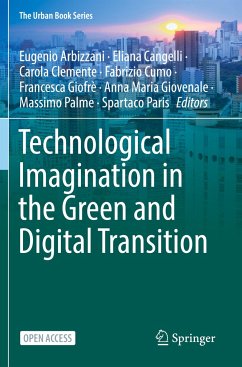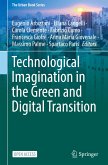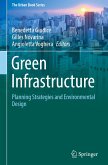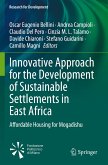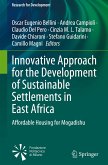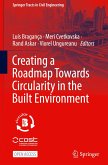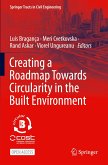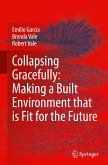Technological Imagination in the Green and Digital Transition
Herausgegeben:Arbizzani, Eugenio; Cangelli, Eliana; Clemente, Carola; Cumo, Fabrizio; Giofrè, Francesca; Giovenale, Anna Maria; Palme, Massimo; Paris, Spartaco
Technological Imagination in the Green and Digital Transition
Herausgegeben:Arbizzani, Eugenio; Cangelli, Eliana; Clemente, Carola; Cumo, Fabrizio; Giofrè, Francesca; Giovenale, Anna Maria; Palme, Massimo; Paris, Spartaco
- Broschiertes Buch
- Merkliste
- Auf die Merkliste
- Bewerten Bewerten
- Teilen
- Produkt teilen
- Produkterinnerung
- Produkterinnerung
This open access book addresses the pressing need for sustainability in urban development and the use of technology, with cities to serve as the main stage for strategies that seek to meet the targets and the cross-sector priorities indicated in the EU's Next Generation program, all in pursuit of a solid recovery on the part of the European economy, along lines of ecological transition, digitalization, competitiveness, training, and inclusion to overcome social, territorial, and gender differences. The international study encounter is meant to promote visions shared by architectural technology…mehr
Andere Kunden interessierten sich auch für
![Technological Imagination in the Green and Digital Transition Technological Imagination in the Green and Digital Transition]() Technological Imagination in the Green and Digital Transition42,99 €
Technological Imagination in the Green and Digital Transition42,99 €![Green Infrastructure Green Infrastructure]() Green Infrastructure117,99 €
Green Infrastructure117,99 €![Innovative Approach for the Development of Sustainable Settlements in East Africa Innovative Approach for the Development of Sustainable Settlements in East Africa]() Innovative Approach for the Development of Sustainable Settlements in East Africa65,99 €
Innovative Approach for the Development of Sustainable Settlements in East Africa65,99 €![Innovative Approach for the Development of Sustainable Settlements in East Africa Innovative Approach for the Development of Sustainable Settlements in East Africa]() Innovative Approach for the Development of Sustainable Settlements in East Africa89,99 €
Innovative Approach for the Development of Sustainable Settlements in East Africa89,99 €![Creating a Roadmap Towards Circularity in the Built Environment Creating a Roadmap Towards Circularity in the Built Environment]() Creating a Roadmap Towards Circularity in the Built Environment42,99 €
Creating a Roadmap Towards Circularity in the Built Environment42,99 €![Creating a Roadmap Towards Circularity in the Built Environment Creating a Roadmap Towards Circularity in the Built Environment]() Creating a Roadmap Towards Circularity in the Built Environment34,99 €
Creating a Roadmap Towards Circularity in the Built Environment34,99 €![Collapsing Gracefully: Making a Built Environment that is Fit for the Future Collapsing Gracefully: Making a Built Environment that is Fit for the Future]() Emilio GarciaCollapsing Gracefully: Making a Built Environment that is Fit for the Future37,99 €
Emilio GarciaCollapsing Gracefully: Making a Built Environment that is Fit for the Future37,99 €-
-
-
This open access book addresses the pressing need for sustainability in urban development and the use of technology, with cities to serve as the main stage for strategies that seek to meet the targets and the cross-sector priorities indicated in the EU's Next Generation program, all in pursuit of a solid recovery on the part of the European economy, along lines of ecological transition, digitalization, competitiveness, training, and inclusion to overcome social, territorial, and gender differences.
The international study encounter is meant to promote visions shared by architectural technology and other disciplines, which, though they may appear to differ, are closely interconnected, with the aim of achieving an open, interdisciplinary integration capable of proposing concrete projects regarding topics held to be of strategic importance to the future of the built environment. These are identified to draw up evolving scenarios of architecture and cities suited to reflection, at various levels, on innovative models of process and product.
Hinweis: Dieser Artikel kann nur an eine deutsche Lieferadresse ausgeliefert werden.
The international study encounter is meant to promote visions shared by architectural technology and other disciplines, which, though they may appear to differ, are closely interconnected, with the aim of achieving an open, interdisciplinary integration capable of proposing concrete projects regarding topics held to be of strategic importance to the future of the built environment. These are identified to draw up evolving scenarios of architecture and cities suited to reflection, at various levels, on innovative models of process and product.
Hinweis: Dieser Artikel kann nur an eine deutsche Lieferadresse ausgeliefert werden.
Produktdetails
- Produktdetails
- The Urban Book Series
- Verlag: Author Funded / Springer / Springer International Publishing / Springer, Berlin
- Artikelnr. des Verlages: 978-3-031-29517-1
- 1st ed. 2023
- Seitenzahl: 1076
- Erscheinungstermin: 30. Juni 2023
- Englisch
- Abmessung: 235mm x 155mm x 54mm
- Gewicht: 1787g
- ISBN-13: 9783031295171
- ISBN-10: 303129517X
- Artikelnr.: 67508335
- Herstellerkennzeichnung
- Books on Demand GmbH
- In de Tarpen 42
- 22848 Norderstedt
- info@bod.de
- 040 53433511
- The Urban Book Series
- Verlag: Author Funded / Springer / Springer International Publishing / Springer, Berlin
- Artikelnr. des Verlages: 978-3-031-29517-1
- 1st ed. 2023
- Seitenzahl: 1076
- Erscheinungstermin: 30. Juni 2023
- Englisch
- Abmessung: 235mm x 155mm x 54mm
- Gewicht: 1787g
- ISBN-13: 9783031295171
- ISBN-10: 303129517X
- Artikelnr.: 67508335
- Herstellerkennzeichnung
- Books on Demand GmbH
- In de Tarpen 42
- 22848 Norderstedt
- info@bod.de
- 040 53433511
Eugenio Arbizzani, Ph.D. is Full Professor of Architectural Technology, Sapienza University of Rome. In his trentennial professional experience he has developed the integrated design of complex buildings for private and public clients, most of them built, mainly in the sectors of hospital and social health construction, social housing, school construction, and cultural heritage. He carries out research and development with a focus on different scientific fields: integrated design and project and construction management services; tools and methodologies for the management of the building process; building models and innovative technologies for hospital construction and social housing; testing of systems and components for the technological upgrading of buildings; and building envelope and ICT technologies for the AAL project. Eliana Cangelli, PhD, is Associate Professor of Technological Design, Sapienza University of Rome. She is Vice President of Eurosolar World - European Association for Renewable Energy and member of the Committee for Urban and Building Quality established by the City of Rome. Since 1993 she has been carrying out scientific, didactic, planning and consulting activities in the fields of urban renewal and environmental sustainability, environmental planning, bioclimatic architecture and energy efficiency for public and private institutions. Her scientific commitment is to the tools and methods for verifying the sustainability of architectural projects at different scales, environmental design and control of the architectural, environmental and energy quality of buildings, and innovation and technological experimentation aimed at the technical, economic, environmental and social sustainability of buildings. Her research activity is documented by the publication of research reports, books, articles and essays, as well as scientific publications and participation in national and international conferences as a guest speaker. Carola Clemente Ph.D. is Associate Professor of Architectural Technology, Sapienza University of Rome. She carries out research and experimentation on the issues of management and control of the feasibility of complex programs, with particular reference to: the design and integrated redevelopment of social housing (housing, construction for training and research, construction for welfare); the technological upgrading and energy retrofit of buildings for training, social housing, and the advanced tertiary sector; Smart Cities and Communities (SCC); and Positive Energy Districts (PED). On these issues, she is engaged in various initiatives to support the public administration in the energy and technological diagnosis of the building heritage for the identification of sustainable intervention strategies and actions in technical, economic, and social terms, with low-cost and low-impact technologies. Fabrizio Cumo, Ph.D. is Associate Professor of Applied Physic, Sapienza University of Rome. He is nuclear engineer and Ph.D. in energetic science. From 2016 to 2022 he was head of CITERA-Interdepartmental Centre for Territory, Building, Conservation and Environment. Since 2015, President of the degree course in Project Management. Leader of the research group of CITERA for the project of a "contingency plan" against oil spills for the Italian Ministry of Environment. Director of the international Summerschool on Bioarchitecture in protected area. Leader of the research group for the evaluation of safety, security, and environmental comfort for operators and work of art (CNR ICVBC). Member of the Italian Commission for the receiving of EU Directive 2002/91/CE for the Ministry of Environment for responsible use of energy in residential area and use of renewable sources. Francesca Giofrè, Ph.D. is Associate Professor of Architectural Technology, Sapienza University of Rome.She was Vice-Dean of the Faculty of Architecture at Sapienza University of Rome (2013-2019). Since 1995 she has carried out research and consultancy activities at the University and other institutions at national and international levels. Her main research areas are: Innovation in the planning process, focusing on the research and development of new tools to help those involved in the construction process to make decisions in the pre-project phase; Innovation in the construction process, focusing her research activities on the construction industry and in particular on safety; Design for all, basing her research activities in this area on the analysis of people's needs to find architectural and technological solutions in different contexts that can provide equal opportunities and healthy city for all. She is the coordinator of some EU projects on the healthy city. She has published several papers, articles, and books on these topics and has carried out many feasibility studies in thefield of architecture for health. Anna Maria Giovenale, Ph.D, is Full Professor of Architectural Technology, Vice-rector to the spaces for university and healthcare buildings in Sapienza, University of Rome, member of the Technical Scientific Committee on Diversity and Inclusion and of the Scientific Council of the Fondazione Roma Sapienza. She was Dean of the Faculty of Architecture at the Sapienza, University of Rome from 2014 to 2020. She carries out research and development activities mainly on the following thematic areas: innovation in the methods and tools for the management and for the quality control of building processes and of design at the different scales of intervention; with particular attention to complex public buildings. On these issues, she carried out an intense research and third Mission activity and design experimentation, in particular with application to the healthcare buildings and contributed to the development of technical standards and guidelines for public institutions. Massimo Palme is Associate Professor in Architecture, Technical University Federico Santamaria; Extraordinary Professor, Catholic University of the North; and Visiting Researcher, Sapienza University of Rome. Since 2006, he develops research on the topic of climate change and built environment, building performance simulation, urban climate, and sustainability. He is President of the Chilean Chapter of the International Building Performance Simulation Association and Vice President of the Chilean Chapter of the International Landscape Ecology Association, and Massimo is Author of more than 100 contributions published in books, proceedings, and journals. He has been Visiting Researcher at several institutions in Italy, Ecuador, Brazil, and Japan as Fellow of the Japanese Society for the Promotion of Science. Spartaco Paris, Ph.D. is Full Professor of Technological Design, SapienzaUniversity of Rome. MSc Degree in Architecture at Sapienza University of Rome in 1999. PhD in Environmental Energy Technologies for Development; he has been scholar at ETH in 2003; he was professor at Polytechnic of Bari. He's currently Chair of Msc in Project and Construction Management of building systems at Sapienza University of Rome. He develops his research around the topics of new technologies, digital processes, sustainability in the broad area of design, between architecture and industry. Since 2022 is director of CITERA, Interdepartmental Centre of Research Territory, Building, Restoration Environment at Sapienza University of Rome.
From a liquid society, through technological imagination, to beyond the knowledge society.- Opening lecture: Digital spaces and the material culture.- Part 1: Innovation.- Innovation for the digitization process of the AECO sector.- The digital revolution and the art of co-creation.- Towards a new humanism of technological innovation in design of the built environment.- A bim-based approach to energy analysis of existing buildings in the Italian context.- Short-term wind speed forecasting model using hybrid neural networks and wavelet packet decomposition.- COGNIBUILD: Cognitive digital twin framework for advanced building management and predictive maintenance.- Design of CCHP system with the help of combined chiller system, solar energy, and gas microturbine.- Digital construction and management the public's infrastructures.- An innovative multi-objective optimization digital workflow for social housing deep energy renovation design process.- Digital information management in thebuilt environment: Data-driven approaches for building process optimization.- Immersive facility management - A methodological approach based on BIM and mixed reality for training and maintenance operations.- A digital information model for coastal maintenance and waterfront recovery.- Sustainable workplace: Space planning model to optimize environmental impact.- Digital twin models supporting cognitive buildings for ambient assisted living.- Less automation more information: A learning tool for a post-occupancy operation and evaluation.- A prosumer approach for feeding the digital twin. Testing the must application in the old harbor waterfront of Genoa.- Untapping the potential of the digital towards the green imperative: the interdisciplinary BeXLab experience.- Digital-twin for an innovative waterfront management strategy. Pilot project DSH2030.- BIM and BPMN 2.0 integration for interoperability challenge in construction industry.- Digital twin approach for maintenance management.-Digital infrastructure for student accommodations in european university cities: The "HOME" project.- Part 2: Technology.- Technologies for the construction of buildings and cities of the near future.- The living lab for autonomous driving as applied research of MaaS models in the smart city: the case study of MASA - Modena Automotive Smart Area.- Expanding the wave of smartness: Smart buildings, another frontier of the digital revolution.- Sharing innovation. The acceptability of off-site industrialized systems for housing.- 3D printing for housing. Recurring architectural themes.- Photovoltaic breakthrough in architecture: Integration and innovation best practice.- Reworking studio design education driven by 3D printing technologies.- The new technological paradigm in the post-digital era. Three convergent paths between creative action and computational tools.- Technological innovation for circularity and sustainability through buildings' life cycles: Policy, initiatives and stakeholders' perspective.- Fair play: Why reliable data for low tech construction and non-conventional materials are needed.- Part 3: Environment.- Technological innovation for the next ecosystem transition: From a high tech.- To low tech intensity - High efficiency environment.- Technological imagination to stay within planetary boundaries.- Quality-based design for environmentally conscious architecture.- Digital transformation projects for the future digicircular society.- The regulatory apparatus at the service of sustainable planning of the built environment: The case of law 338/2000.- From nature to architecture for low tech solutions: Biomimetic principles for climate-adaptive building envelope.- Soft technologies for the circular transition: Practical experimentation of the product "material passport".- Imaging a carbon neutral university.- Life cycle assessment at the early stage of building design.- Design scenarios for a circular vision of post-disaster temporary settlements.- Towards climate neutrality: Progressing key actions for positive energy districts implementation.- Remanufacturing towards circularity in the construction sector: The role of digital technologies.- Territorial energy potential for energy community and climate mitigation actions: Experimentation on pilot cases in Rome.- Integrated design approach to build a safe and sustainable dual intended use center in Praslin island, Seychelles.- Part 4: Climate changes.- Climate change: New ways to inhabit the earth.- The climate report. Informing the response to climate change in urban development.- The urban riverfront greenway: A linear attractor for sustainable urban development.- The buildings reuse for a music district aimed at a sustainable urban development.- Environmental design for a sustainable district & civic hub.- Earth observation technologies for mitigating urban climate changes.- A systematic catalogue of design solutions for the regeneration of urban environment contrasting the climate change impact.- Digital twins for climate-neutral and resilient cities. State of the art and future development as tools to support urban decision making.- The urban potential of multifamily housing renovation.-A "stepping stone" approach to exploiting urban density.- Metropolitan farms: Long term agri-food systems for sustainable urban landscapes.- Resilient design for outdoor sports infrastructure.- Sustainable reuse indicators for ecclesiastic built heritage regeneration.- A green technological rehabilitation of the built environment. From public residential estates to eco-districts.- Adaptive building technologies for building envelopes under climate change conditions.- The importance of testing activities for a "new" generation of building envelope.- Data visualization and web-based mapping for SGDs and adaptation to climate change in the urban environment.- Fog water harvesting through smart façade for a climate resilient built environment.- Building façade retrofit: A comparison between current methodologies and innovative membranes strategies for overcoming the existing retrofit constraints.- Technologies and solutions for collaborative processes in mutating cities.- New perspectives for the building heritage in depopulated areas: A methodological approach for evaluating sustainable reuse and upcycling strategies.- Climate adaptation in urban regeneration: A cross-scale digital design workflow.- Adaptive "velari".- Temporary climate change adaptation: 5 measures for outdoor spaces of the mid-adriatic city.- Serious game: New tools for exploring and designing urban sustainability.- Energy efficiency improvement in industrial brownfield heritage buildings: Case study of "Beko".- Industrial heritage of Belgrade: Brownfield sites revitalization status, potentials and opportunities missed.- Challenges and potentials of green roof retrofit: A case study.- Designing with nature climate-resilient cities: A lesson from Copenhagen.- New urban centralities universities as a paradigm for a sustainable city.- Part 5: Health.- Environment for healthy living.- New paradigms for indoor healthy living.- Healthy and empowering life in schoolyards. The case of Dante Alighieri school in Milan.- Design for emergency: Inclusive housing solution.- Environmental sensing and simulations for healthy districts: A comparison between field measurements and CFD model.- A synthesis paradigm as a way of bringing back to life the artistic monuments inspired by the motives of the people's liberation struggle and revolution of Yugoslavia.- Social sustainability and inclusive environments in neighborhood sustainability assessment tools.- Inclusive neighborhoods in a healthy city: Walkability assessment and guidance in Rome.- Tools and strategies for health promotion in urban context: Technology and innovation for enhancing parish ecclesiastical heritage through sport and inclusion.- Nursing homes during Covid-19 pandemic - A systematic literature review for Covid-19 proof architecture design strategies.- A new generation of territorial healthcare infrastructures after Covid-19. The transition to community homes and community hospitals into the framework of the Italian recovery plan.- Wood Snoezelen. Multisensory wooden environments for the care and rehabilitation of people with severe and very severe cognitive disabilities.- The proximity of urban green spaces as urban health strategy to promote active, inclusive and salutogenic cities.- Environmental attributes for healthcare professional's well-being.
From a liquid society, through technological imagination, to beyond the knowledge society.- Opening lecture: Digital spaces and the material culture.- Part 1: Innovation.- Innovation for the digitization process of the AECO sector.- The digital revolution and the art of co-creation.- Towards a new humanism of technological innovation in design of the built environment.- A bim-based approach to energy analysis of existing buildings in the Italian context.- Short-term wind speed forecasting model using hybrid neural networks and wavelet packet decomposition.- COGNIBUILD: Cognitive digital twin framework for advanced building management and predictive maintenance.- Design of CCHP system with the help of combined chiller system, solar energy, and gas microturbine.- Digital construction and management the public's infrastructures.- An innovative multi-objective optimization digital workflow for social housing deep energy renovation design process.- Digital information management in thebuilt environment: Data-driven approaches for building process optimization.- Immersive facility management - A methodological approach based on BIM and mixed reality for training and maintenance operations.- A digital information model for coastal maintenance and waterfront recovery.- Sustainable workplace: Space planning model to optimize environmental impact.- Digital twin models supporting cognitive buildings for ambient assisted living.- Less automation more information: A learning tool for a post-occupancy operation and evaluation.- A prosumer approach for feeding the digital twin. Testing the must application in the old harbor waterfront of Genoa.- Untapping the potential of the digital towards the green imperative: the interdisciplinary BeXLab experience.- Digital-twin for an innovative waterfront management strategy. Pilot project DSH2030.- BIM and BPMN 2.0 integration for interoperability challenge in construction industry.- Digital twin approach for maintenance management.-Digital infrastructure for student accommodations in european university cities: The "HOME" project.- Part 2: Technology.- Technologies for the construction of buildings and cities of the near future.- The living lab for autonomous driving as applied research of MaaS models in the smart city: the case study of MASA - Modena Automotive Smart Area.- Expanding the wave of smartness: Smart buildings, another frontier of the digital revolution.- Sharing innovation. The acceptability of off-site industrialized systems for housing.- 3D printing for housing. Recurring architectural themes.- Photovoltaic breakthrough in architecture: Integration and innovation best practice.- Reworking studio design education driven by 3D printing technologies.- The new technological paradigm in the post-digital era. Three convergent paths between creative action and computational tools.- Technological innovation for circularity and sustainability through buildings' life cycles: Policy, initiatives and stakeholders' perspective.- Fair play: Why reliable data for low tech construction and non-conventional materials are needed.- Part 3: Environment.- Technological innovation for the next ecosystem transition: From a high tech.- To low tech intensity - High efficiency environment.- Technological imagination to stay within planetary boundaries.- Quality-based design for environmentally conscious architecture.- Digital transformation projects for the future digicircular society.- The regulatory apparatus at the service of sustainable planning of the built environment: The case of law 338/2000.- From nature to architecture for low tech solutions: Biomimetic principles for climate-adaptive building envelope.- Soft technologies for the circular transition: Practical experimentation of the product "material passport".- Imaging a carbon neutral university.- Life cycle assessment at the early stage of building design.- Design scenarios for a circular vision of post-disaster temporary settlements.- Towards climate neutrality: Progressing key actions for positive energy districts implementation.- Remanufacturing towards circularity in the construction sector: The role of digital technologies.- Territorial energy potential for energy community and climate mitigation actions: Experimentation on pilot cases in Rome.- Integrated design approach to build a safe and sustainable dual intended use center in Praslin island, Seychelles.- Part 4: Climate changes.- Climate change: New ways to inhabit the earth.- The climate report. Informing the response to climate change in urban development.- The urban riverfront greenway: A linear attractor for sustainable urban development.- The buildings reuse for a music district aimed at a sustainable urban development.- Environmental design for a sustainable district & civic hub.- Earth observation technologies for mitigating urban climate changes.- A systematic catalogue of design solutions for the regeneration of urban environment contrasting the climate change impact.- Digital twins for climate-neutral and resilient cities. State of the art and future development as tools to support urban decision making.- The urban potential of multifamily housing renovation.-A "stepping stone" approach to exploiting urban density.- Metropolitan farms: Long term agri-food systems for sustainable urban landscapes.- Resilient design for outdoor sports infrastructure.- Sustainable reuse indicators for ecclesiastic built heritage regeneration.- A green technological rehabilitation of the built environment. From public residential estates to eco-districts.- Adaptive building technologies for building envelopes under climate change conditions.- The importance of testing activities for a "new" generation of building envelope.- Data visualization and web-based mapping for SGDs and adaptation to climate change in the urban environment.- Fog water harvesting through smart façade for a climate resilient built environment.- Building façade retrofit: A comparison between current methodologies and innovative membranes strategies for overcoming the existing retrofit constraints.- Technologies and solutions for collaborative processes in mutating cities.- New perspectives for the building heritage in depopulated areas: A methodological approach for evaluating sustainable reuse and upcycling strategies.- Climate adaptation in urban regeneration: A cross-scale digital design workflow.- Adaptive "velari".- Temporary climate change adaptation: 5 measures for outdoor spaces of the mid-adriatic city.- Serious game: New tools for exploring and designing urban sustainability.- Energy efficiency improvement in industrial brownfield heritage buildings: Case study of "Beko".- Industrial heritage of Belgrade: Brownfield sites revitalization status, potentials and opportunities missed.- Challenges and potentials of green roof retrofit: A case study.- Designing with nature climate-resilient cities: A lesson from Copenhagen.- New urban centralities universities as a paradigm for a sustainable city.- Part 5: Health.- Environment for healthy living.- New paradigms for indoor healthy living.- Healthy and empowering life in schoolyards. The case of Dante Alighieri school in Milan.- Design for emergency: Inclusive housing solution.- Environmental sensing and simulations for healthy districts: A comparison between field measurements and CFD model.- A synthesis paradigm as a way of bringing back to life the artistic monuments inspired by the motives of the people's liberation struggle and revolution of Yugoslavia.- Social sustainability and inclusive environments in neighborhood sustainability assessment tools.- Inclusive neighborhoods in a healthy city: Walkability assessment and guidance in Rome.- Tools and strategies for health promotion in urban context: Technology and innovation for enhancing parish ecclesiastical heritage through sport and inclusion.- Nursing homes during Covid-19 pandemic - A systematic literature review for Covid-19 proof architecture design strategies.- A new generation of territorial healthcare infrastructures after Covid-19. The transition to community homes and community hospitals into the framework of the Italian recovery plan.- Wood Snoezelen. Multisensory wooden environments for the care and rehabilitation of people with severe and very severe cognitive disabilities.- The proximity of urban green spaces as urban health strategy to promote active, inclusive and salutogenic cities.- Environmental attributes for healthcare professional's well-being.

